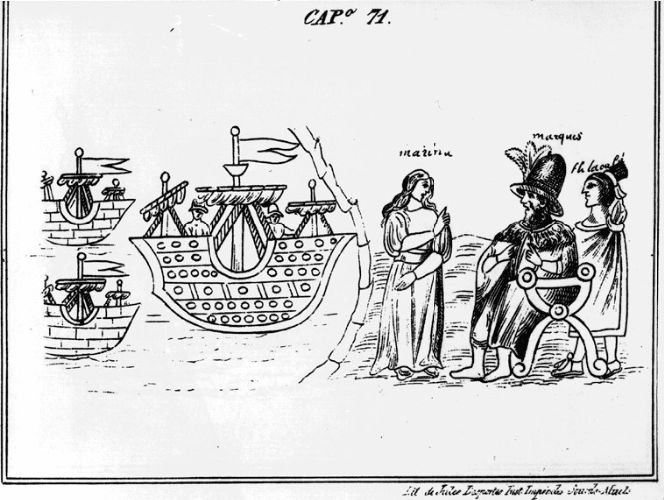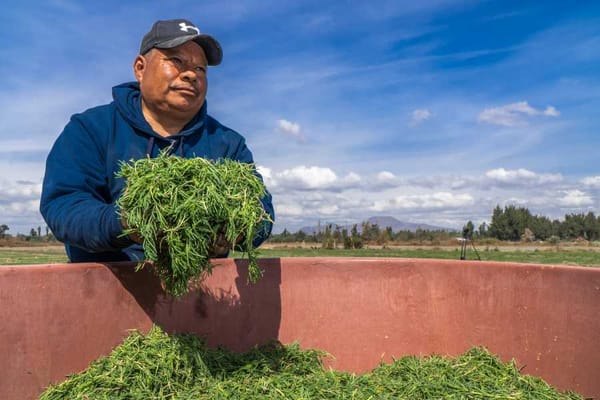The times of Malintzin: Was Marina really a betrayer of Mexicas?
Many things are unknown about her despite her historical importance, including her real name, since all the nicknames that have been given to her throughout the centuries derive from "Marina". Was Malintzin a betrayer of the Mexica people?

Malintzin, Malinalli, Malinche, or Doña Marina was a key character in the conquest of Mexico-Tenochtitlan, relevant to such a degree that the Spanish soldiers and chroniclers referred to her with gratitude, while the indigenous people represented her in many codices with royal attire and in a size equal to that given to the figure of Hernán Cortés himself.
In spite of her historical importance, many things are unknown about her, including her real name, since all the nicknames that have been given to her throughout the centuries derive from "Marina", as she was baptized by Canon Juan Díaz in 1519.
Did Marina betray the Mexica people?
This idea, overcome since the middle of the last century when professional historiography distanced itself from the interests of the State", was created with the triumph of the independence movement and the liberal model of the 19th century, which gave a negative character to Mexico's Spanish heritage. Who did Marina betray? She was not a Mexica. According to various sources, it is theorized that she was born in a Nahua lordship called Olotlan, close to the current territory of Coatzacoalcos, Veracruz.
According to one of Marina's best biographers, the American Camilla Townsend, she said that it would have been in her early years, or in her early adolescence when Marina suffered the death of her father, the lord of Olotlan -an altépetl oppressed by the Triple Alliance-, and then, fearing that she would come between the political aspirations of her stepfather and her stepbrothers, she was sold as a domestic slave to merchants in present-day Tabasco; although other versions suggest that she was stolen.
The harsh circumstances she must have gone through surely influenced her choice of herself within her context. Marina could have glimpsed the Spanish incursion as an escape route for her condition as a slave, when she had, in 1518, news of the arrival of Juan de Grijalva to Tabasco. A year later, after the Spanish victory in the so-called Battle of Centla, she was included, or perhaps found a way to be included, in a group of 20 women that the Mayan indigenous people gave to Hernán Cortés as spoils of war.
Baptized and ceded to the soldier Alonso Hernández Portocarrero, Marina proved to be "easy-going, intelligent and very beautiful", according to the conquerors' testimonies, so it was soon Cortés himself who made her his concubine, companion, and translator; this last function she carried out in the company of Jerónimo de Aguilar. The Battle of Centla must have been of great importance for Marina, since it was one of the few occasions in which the Spaniards, even without indigenous allies, fought against Mesoamericans, demonstrating the superiority of their war technology.

"I have the impression that Malintzin - the name the Indians used to refer to her as a noblewoman - conveyed to the people how ideal it would be for them to ally with the Castilians to defeat the powerful Mexica." - Martínez Baracs, member of the Mexican Academy of History.
Equally treated with a western noble title, Doña Marina, must have been key during the four months that the Spanish army remained in Veracruz, before marching to Tenochtitlan, because it was probably then when she explained to Cortés how the social and political configuration of Mesoamerica was, that is, that the Mexica had enemies.
Malintzin's transcendence goes beyond the sole role of translator or companion of Hernán Cortés, as she was actually a mediator between two worldviews and, perhaps, not only entrusted the Spaniards with how to conquer Mesoamerica, but was also influential in transmitting to them what was necessary to preserve of that indigenous world, which became the New Spain and, finally, derived in today's Mexico.
In 1522, Malintzin became a mother. Her first child and Hernán Cortés' first son was born. Cortes arranged the wedding of Malintzin and Juan Jaramillo, a man who had accompanied him faithfully since his arrival in Veracruz. By marrying a Spaniard, Malintzin gained rights and her position changed forever. She had a daughter, Maria, with Jaramillo. Malintzin died before her 30th birthday, perhaps as a victim of one of the many smallpox epidemics.
Source: INAH




